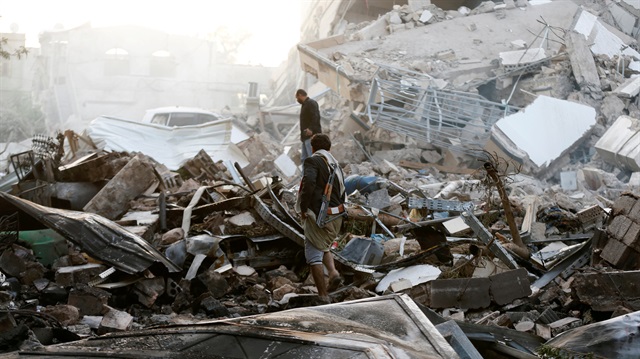
Air strikes by the Saudi-led coalition in Yemen's war have caused heavy civilian casualties at marketplaces, weddings and on fishing boats, some of which may amount to war crimes, United Nations human rights experts said on Tuesday.
Saudi Arabia is leading a Western-backed alliance of Arab states trying to restore the internationally recognized government of Yemeni President Abd-Rabbu Mansour Hadi, ousted from the capital Sanaa by the Iran-aligned Houthis in 2015.
Fighters of the Houthi movement have fired missiles into Saudi Arabia, blocked delivery of supplies to Taiz and shelled the strategic city from the highlands, the panel said. They have also committed torture, a war crime, it said.
Coalition forces have imposed severe restrictions on Red Sea ports and Sanaa airport, depriving Yemenis of vital supplies which may also constitute international crimes, the independent experts said in their first report to the Human Rights Council.
The coalition's additional inspection procedures at Hodeidah port have had a "chilling effect on commercial shipping", although no U.N. or coalition searches had discovered weapons being smuggled into Yemen where 8.4 million people are on the brink of famine, it said.
"Coalition air strikes have caused most of the documented civilian casualties. In the past three years, such air strikes have hit residential areas, markets, funerals, weddings, detention facilities, civilian boats and even medical facilities," the panel said.
Its investigation of 11 incidents raised "serious concerns about the targeting process applied by the coalition". Strikes that fail to spare people or structures protected by international humanitarian law would be unlawful violations.
"Individuals in the (Yemeni) government and the coalition, including Saudi Arabia and the United Arab Emirates, may have conducted attacks in violation of the principles of distinction, proportionality and precaution that may amount to war crimes," the experts said, adding that they had compiled a confidential list of suspects.
There was no immediate reaction from those governments, which received an advance copy of the report from the United Nations.
All sides have conscripted children between 11 and 17 years and used them to participate in the hostilities, also war crimes, the 41-page report said.
It was released ahead of U.N. peace talks between the government and Houthis on Sept. 6 in Geneva.
The panel, headed by Tunisian expert Kamel Jendoubi, neither specifically referred to the United States and Britain, which provide arms and intelligence to the Saudi-led alliance, nor did it point a finger at Iranian support to the Houthis.






